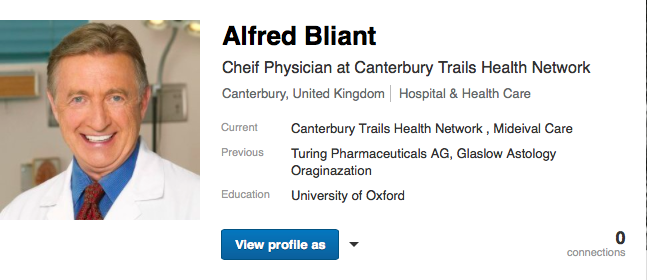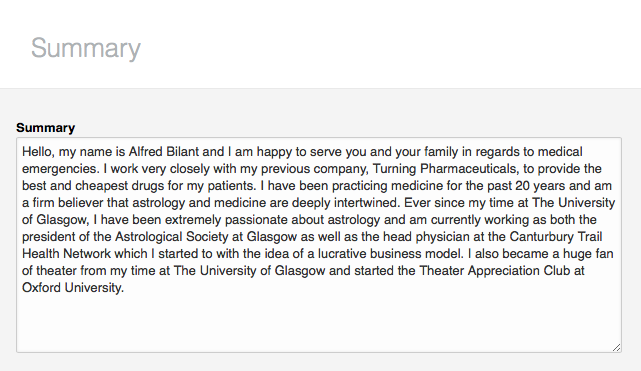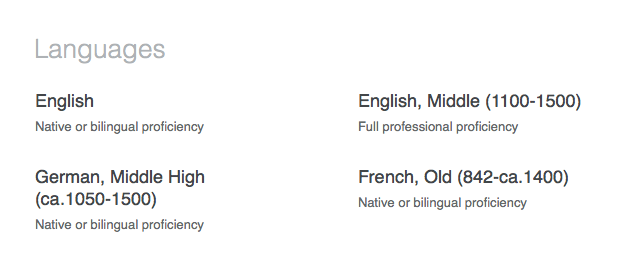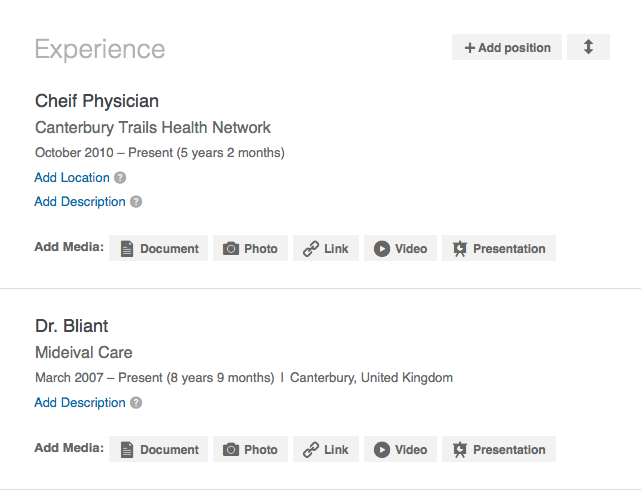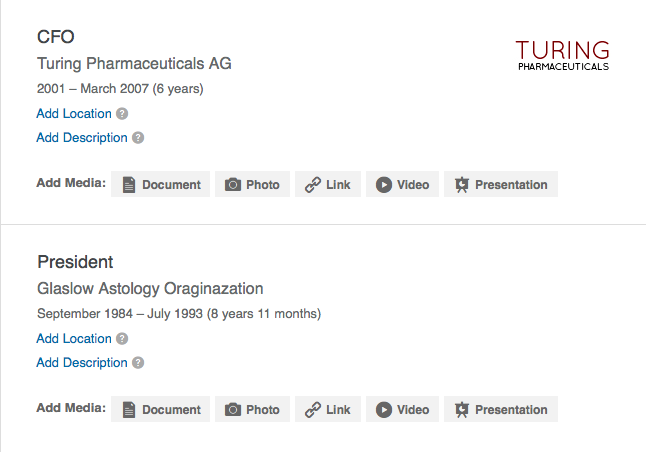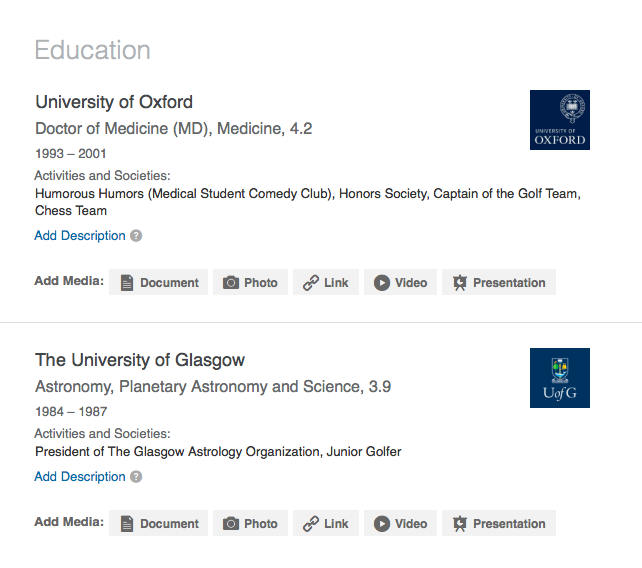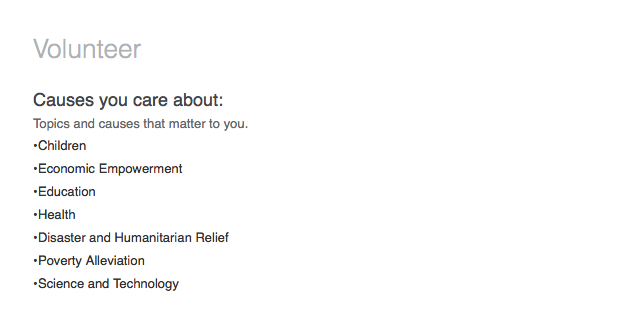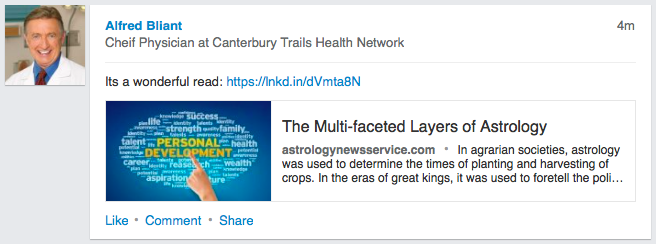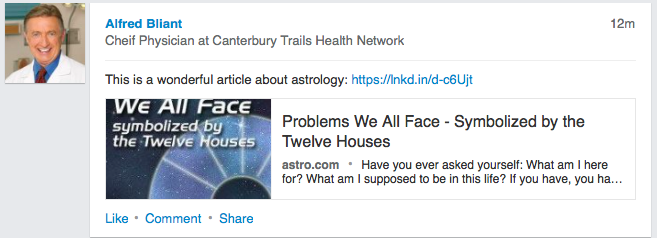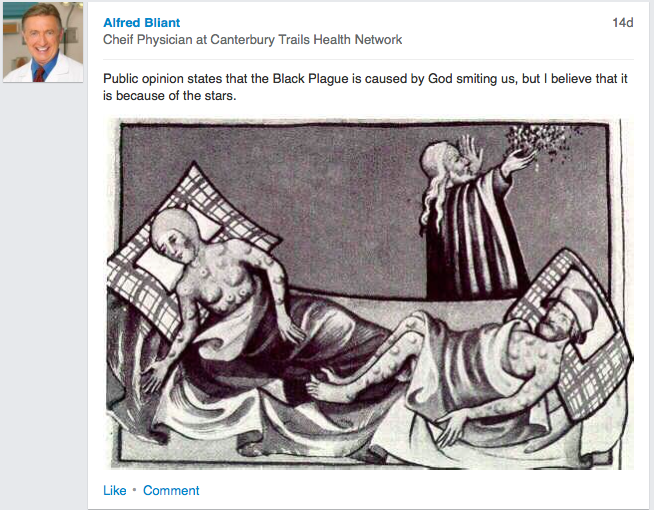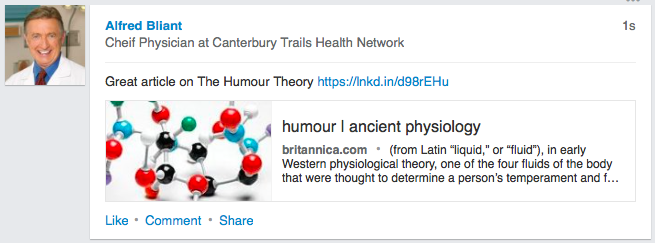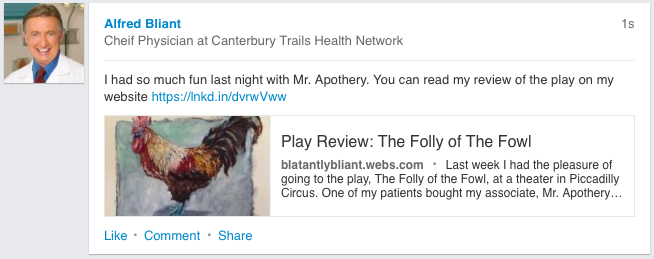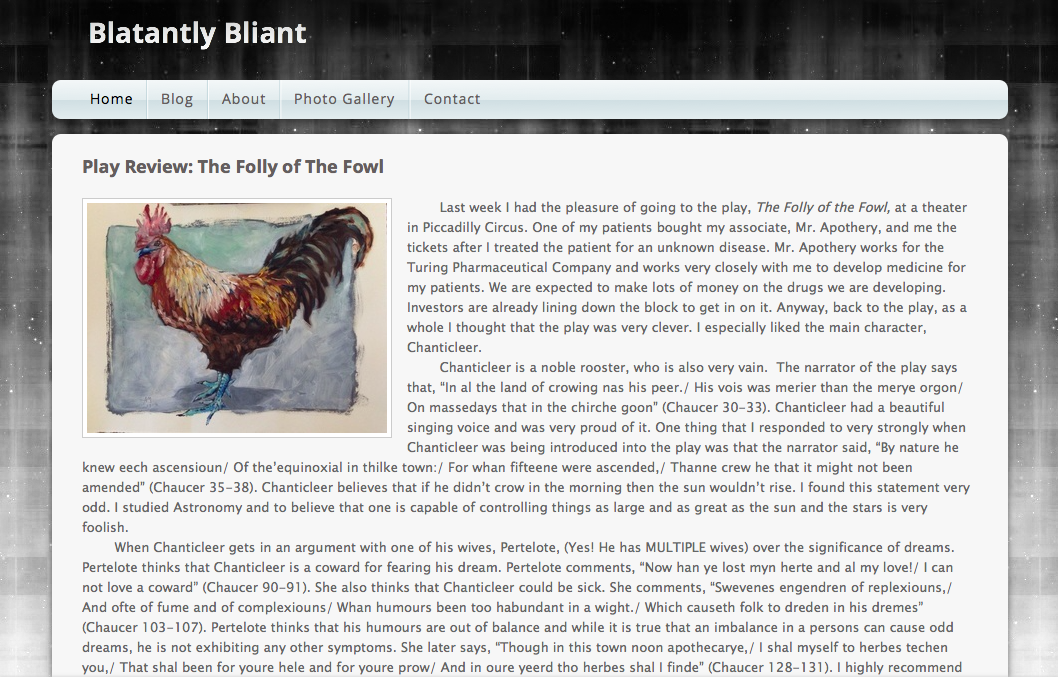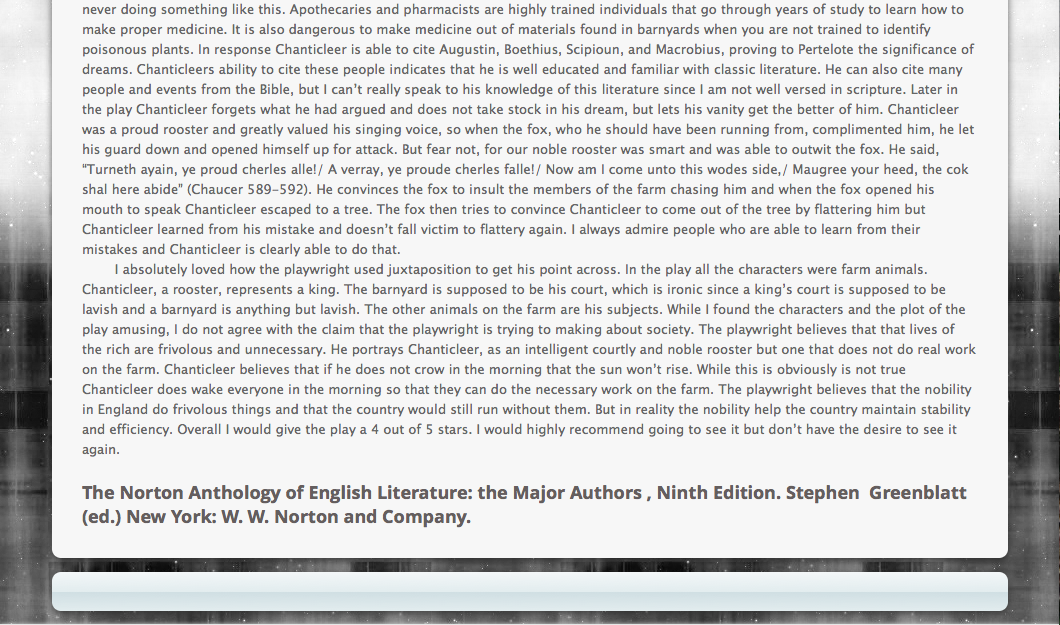The Physician
https://www.linkedin.com/profile/viewid=AAMAABsGfOUBmKvXtPsJqNmNxzisg8xyOSOXAoM&trk=hp-identity-name
http://blatantlybliant.webs.com
In the Canterbury Tales, Chaucer creates many grand and humorous characters to provide the satirical stereotypes of prominent roles in 14th century English society. The good characters, such as the Knight, the Nun's Priest, and the Physician, do not get as much notice as some of the roguish hypocrites and criminals; they are, however, very important and interesting characters, who set good moral examples, and give the readers hope. In order to help the Physician write his autobiography and to create his commonplace book in the most accurate way, we looked at what the narrator has said about the Physician in the General Prologue, what the Physician says in his tale, and to what literary and historical experts have said about the character and the time in which he lived.
We chose to make the Physician’s autobiography on the website LinkedIn, because he is a very professional person who would want to present himself on a serious, online platform. In the General Prologue, Chaucer states that The Physician has numerous connections to other apothecaries and doctors, leading us to believe that Linkedin would be the best website for him to maintain relationships and communicate with pharmaceutical companies on. We choose to name the Physician Alfred Bliant, because the name Alfred means wise, and the name Bliant means healer, which are consistent with the description of the Physician in the General Prologue. Through his LinkedIn profile we attempted to recreate Chaucer’s description of the Physician, through description of his work experience, his education, his skills and through online post he makes. In the General Prologue Chaucer also expresses the utilitarian nature of the Physician’s job. To respond to this we chose for the Physician to be proficient in Old English, Middle German and Middle French, because he would have needed to communicate with lower class patients, who spoke Middle German, and upper class aristocrats, who spoke Middle French, in medieval society.
The Physician's commonplace book is a review of a play adaptation of the Nun’s Priest’s Tale, that we named The Folly of the Fowl. We choose to make the commonplace book a play review because his income allows him to be cultured and to spend time in upper class environments, such as theaters. We also felt that, based on his description, his character would not only attend plays but also be the type of person to review them. In the review we make references to his interests and use quotes from the Tale that we felt he would react to.
Most of what we know about the Physician comes from the narrator's description of the character in the General Prologue. The narrator tells his audience, "In all the world ne was ther noon him lik to speken of physic and surgerye" (Norton, p.203, l.14 -15). In addition, the narrator speaks highly of the Physician's vast knowledge of medicine. We made the Physician the Chief Physician at the Canterbury Health Network because of the narrator's description of the Physician’s knowledge and competence. The narrator tells his audience the Physician is, "grounded in astronomye" (Norton p. 203, 416); the Physician uses star positions and astrology to cure his patients. He is a great diagnostician and the narrator praises the doctor for knowing "the cause of every maladye" (Norton p. 203, 421); furthermore, the physician is highly competent in a variety of healing procedures. Many of the medical procedures that the Physician performs are based on the humor theory, which was very important to medieval doctors; there were four humors, that people believed has to be kept in balance to keep a person healthy. Based on the description of the Physician’s medical practises we wrote a post on his Linkedin profile about a procedure that he had done to balance a patient's humours. He used both star alignment, the humour theory and is medical knowledge to help the patient. On another post the Physician shared a link to an article about the humours theory. The narrator states that the Physician always gave the correct treatments and medicat ion for his patients, through a coordinated effort with apothecaries.
The Physician's Tale gives the audience additional information about the character and appearance of the doctor. The ideas incorporated into the tale and the nature of the language the bard uses in telling his story give the audience a better idea of who the Physician is. From The Physician’s Tale we know that he originally went to university to study Astronomy and Astrology; due to this we choose to have Alfred Bliant get his undergraduate degree in Astronomy from the University of Glasgow. While he was at university, the plague broke out and the Physician choose to start training to become a doctor. On his LinkedIn profile we have that Albert Bliant studied Medicine at Oxford, which is where he says he went in The Physician’s Tale. Although he does not work in the astrology field, the Physician is very passionate about astrology and uses it while practicing medicine, so on his LinkedIn profile we made him the president of the Glasgow Astrology Organization. The subject choice and the language used to tell the story show the Physician to be a good man with strong morals, who believes in carrying out his duties in a noble manner.
While the doctor is often praised, he does have some faults. In the narrator’s description of the Physician, he can be seen as greedy, vain, and a bad Christian. The narrator accuses the doctor of loving his gold too much. In addition, the narrator accuses the doctor of saving his money and being miserly. The Physician also did not make his fortune on his medical work alone; much of it came from his work with apothecaries. The Physician would get money in return for prescribing medicine to his patients from certain apothecaries. On Alfred Bliant’s Linkedin profile, it states on the summary section that he works closely with his former employers, Turning Pharmaceutical to develop medicine for his patients. We also make references to his involvement with Pharmaceutical companies in the commonplace book, with Mr. Apothecary, and in some of his posts on Linkedin. Although the narrator praises the doctor for being well read, having read medical and classical authors from "Esculapius" to “Gilbertin" (Norton. p.204, 431-436 ). The narrator also states, "His studye was but litel of the Bible" (Norton. p.204, 440). During this time, it was a social norm to be well versed in the Bible and good Christians studied the Bible. We reference the Physician's lack of biblical study in the commonplace book, when he praises Chanticleers understanding of classical Literature. Some scholars argue that the "Physician's Tale" confirms all the negative things the narrator has insinuated in the General Prologue, but the evidence does not support these views.
In the Canterbury Tales, Chaucer ridicules the rogues - the Friar, the Summoner, the Pardoner, the Miller, as well as the Reeve to name a few; at the same time, he praises the good guys. The Physician's description in the General Prologue together with "The Physician's Tale" and the input of scholarly research make it clear that the Physician is a well trained, competent doctor in his time, and a moral, honorable man with a strong sense of duty, think Dr. Ozz Madeleine Crossman sums the Physician up beautifully: "Rather than a figure of satire, condemnation, and amusement, the Physician is a splendid representative of both Medieval Physicians and Medieval surgeons" (Crossman, 2439).
We chose to make the Physician’s autobiography on the website LinkedIn, because he is a very professional person who would want to present himself on a serious, online platform. In the General Prologue, Chaucer states that The Physician has numerous connections to other apothecaries and doctors, leading us to believe that Linkedin would be the best website for him to maintain relationships and communicate with pharmaceutical companies on. We choose to name the Physician Alfred Bliant, because the name Alfred means wise, and the name Bliant means healer, which are consistent with the description of the Physician in the General Prologue. Through his LinkedIn profile we attempted to recreate Chaucer’s description of the Physician, through description of his work experience, his education, his skills and through online post he makes. In the General Prologue Chaucer also expresses the utilitarian nature of the Physician’s job. To respond to this we chose for the Physician to be proficient in Old English, Middle German and Middle French, because he would have needed to communicate with lower class patients, who spoke Middle German, and upper class aristocrats, who spoke Middle French, in medieval society.
The Physician's commonplace book is a review of a play adaptation of the Nun’s Priest’s Tale, that we named The Folly of the Fowl. We choose to make the commonplace book a play review because his income allows him to be cultured and to spend time in upper class environments, such as theaters. We also felt that, based on his description, his character would not only attend plays but also be the type of person to review them. In the review we make references to his interests and use quotes from the Tale that we felt he would react to.
Most of what we know about the Physician comes from the narrator's description of the character in the General Prologue. The narrator tells his audience, "In all the world ne was ther noon him lik to speken of physic and surgerye" (Norton, p.203, l.14 -15). In addition, the narrator speaks highly of the Physician's vast knowledge of medicine. We made the Physician the Chief Physician at the Canterbury Health Network because of the narrator's description of the Physician’s knowledge and competence. The narrator tells his audience the Physician is, "grounded in astronomye" (Norton p. 203, 416); the Physician uses star positions and astrology to cure his patients. He is a great diagnostician and the narrator praises the doctor for knowing "the cause of every maladye" (Norton p. 203, 421); furthermore, the physician is highly competent in a variety of healing procedures. Many of the medical procedures that the Physician performs are based on the humor theory, which was very important to medieval doctors; there were four humors, that people believed has to be kept in balance to keep a person healthy. Based on the description of the Physician’s medical practises we wrote a post on his Linkedin profile about a procedure that he had done to balance a patient's humours. He used both star alignment, the humour theory and is medical knowledge to help the patient. On another post the Physician shared a link to an article about the humours theory. The narrator states that the Physician always gave the correct treatments and medicat ion for his patients, through a coordinated effort with apothecaries.
The Physician's Tale gives the audience additional information about the character and appearance of the doctor. The ideas incorporated into the tale and the nature of the language the bard uses in telling his story give the audience a better idea of who the Physician is. From The Physician’s Tale we know that he originally went to university to study Astronomy and Astrology; due to this we choose to have Alfred Bliant get his undergraduate degree in Astronomy from the University of Glasgow. While he was at university, the plague broke out and the Physician choose to start training to become a doctor. On his LinkedIn profile we have that Albert Bliant studied Medicine at Oxford, which is where he says he went in The Physician’s Tale. Although he does not work in the astrology field, the Physician is very passionate about astrology and uses it while practicing medicine, so on his LinkedIn profile we made him the president of the Glasgow Astrology Organization. The subject choice and the language used to tell the story show the Physician to be a good man with strong morals, who believes in carrying out his duties in a noble manner.
While the doctor is often praised, he does have some faults. In the narrator’s description of the Physician, he can be seen as greedy, vain, and a bad Christian. The narrator accuses the doctor of loving his gold too much. In addition, the narrator accuses the doctor of saving his money and being miserly. The Physician also did not make his fortune on his medical work alone; much of it came from his work with apothecaries. The Physician would get money in return for prescribing medicine to his patients from certain apothecaries. On Alfred Bliant’s Linkedin profile, it states on the summary section that he works closely with his former employers, Turning Pharmaceutical to develop medicine for his patients. We also make references to his involvement with Pharmaceutical companies in the commonplace book, with Mr. Apothecary, and in some of his posts on Linkedin. Although the narrator praises the doctor for being well read, having read medical and classical authors from "Esculapius" to “Gilbertin" (Norton. p.204, 431-436 ). The narrator also states, "His studye was but litel of the Bible" (Norton. p.204, 440). During this time, it was a social norm to be well versed in the Bible and good Christians studied the Bible. We reference the Physician's lack of biblical study in the commonplace book, when he praises Chanticleers understanding of classical Literature. Some scholars argue that the "Physician's Tale" confirms all the negative things the narrator has insinuated in the General Prologue, but the evidence does not support these views.
In the Canterbury Tales, Chaucer ridicules the rogues - the Friar, the Summoner, the Pardoner, the Miller, as well as the Reeve to name a few; at the same time, he praises the good guys. The Physician's description in the General Prologue together with "The Physician's Tale" and the input of scholarly research make it clear that the Physician is a well trained, competent doctor in his time, and a moral, honorable man with a strong sense of duty, think Dr. Ozz Madeleine Crossman sums the Physician up beautifully: "Rather than a figure of satire, condemnation, and amusement, the Physician is a splendid representative of both Medieval Physicians and Medieval surgeons" (Crossman, 2439).
LinkedIn Profile:
"We chose to make the Physician’s autobiography on the website LinkedIn, because he is a very professional person who would want to present himself on a serious, online platform. In the General Prologue, Chaucer states that The Physician has numerous connections to other apothecaries and doctors, leading us to believe that Linkedin would be the best website for him to maintain relationships and communicate with pharmaceutical companies on."
This is a brief summary of who the Physician is.
The Physician is proficient in Old English, Middle German and Middle French, because he would have needed to communicate with lower class patients, who spoke Middle German, and upper class aristocrats, who spoke Middle French, in medieval society.
We made the Physician the Chief Physician at the Canterbury Health Network because of the narrator's description of the Physician’s knowledge and competence. We also made him the CFO of Turing Pharmaceuticals because of the close relationship that he has with apothecaries. While studying at university he developed a passion for Astrology and he uses his knowledge of star positions to treat patients.
"From The Physician’s Tale we know that he originally went to university to study Astronomy and Astrology; due to this we choose to have Alfred Bliant get his undergraduate degree in Astronomy from the University of Glasgow. While he was at university, the plague broke out and the Physician choose to start training to become a doctor. On his LinkedIn profile we have that Albert Bliant studied Medicine at Oxford, which is where he says he went in The Physician’s Tale."
Here is some additional information about him.
LinkedIn Posts:
This post is meant to show the viewer his strong belief in Astrology.
This post is meant to show the viewer his involvement with apothecaries.
This is another post about Astrology.
In The Physicians Tale we learn that the Physician uses star signs to treat patients with the plague, which was not a common idea.
This post is meant to emphasis how much his patients like him.
This is another post that is meant to illustrate his involvement with apothecaries/ pharmaceutical companies. Much of the Physician's fortune comes from his work with apothecaries.
This post is meant to show how the Physician uses astrology to help treat his patience.
This post is meant to show his belief in the Humour Theory.
This post also emphasis's how much his patients like him and to introduce the commonplace book.
He later post a like to the review he wrote for the play.
The Commonplace Book
The Physician's commonplace book is a review of a play adaptation of the Nun’s Priest’s Tale, that we named The Folly of the Fowl. We choose to make the commonplace book a play review because his income allows him to be cultured and to spend time in upper class environments, such as theaters. We also felt that, based on his description, his character would not only attend plays but also be the type of person to review them. In the review we make references to his interests and use quotes from the Tale that we felt he would react to.
Works Cited:
Academic Apparel . www.Academic Apparel . Com /up /History_of _College _Education . Html
Aiken,Pauline "Vincent of Beauvais and the ' Hoares 'of Chaucer' s Physician" SP. 53, 1956 ,23-4
"AMA Journal of Ethics." (Formerly "Virtual Mentor" )
"Fourteenth Century England Medieval Ethics and Plague. " " Virtual Mentor. " April 26 Vol. 8 .Num. 4
256-260
Arnold, Richard H. ," Chaucer's Physician : Teller of Tales ." htps// books google .com /books>
Bassan,Maurice . "Chaucer's 'cursed monk,' Constantinus Africanus. " MS, 24 1962 127-40
The Black Death Express 1348-50 . www .britain express. com >History >Medieval Britain
Black Death Second Pandemic 1361-62 htlps//en. Wikepedia/ Black -Death-In -England>Wiki>medical practice
Bolduan,Nils w.. "Chaucer and Matters Medical. " N E J M.208 1933 1365-68
Bovey,Alixe. www. bl. uk /middle-ages/.../ medicine-diagnosis - and -treatment
Cambridge Journals. Medical History Journal , list>Med.Hist. >53 (3) 2009 ,July>PMC >7065-70
Chaucer,Geoffrey . The Canterbury Tales . George Stade ed.New York ;Barnes and Noble,2007
Chaucer and Clothing/ "Doctor of Phisik." hltps// books . google . com /books>
Chaucer's Major Poetry.Albert C Baugh (ed.) New Jersey : Prentice -Hall,Inc. 1963
Crossman,Madeleine. " Medical Malpractice and Chaucer's Physician "NYSJM . 72 ,1972 ,2439-44
Forty-one Interesting Facts About the Black Death. Random History . com, 2009 ,109
Geoffrey Chaucer: The Canterbury Tales A Selection .Donald R. Howard (ed.) New York ,Penguin Group ,1969
"Health and Medicine in Medieval England ." www. history learning site. co uk /Medieval /Health -and -Medicine-in Medieval -England
Holy Medicine and Diseases of the Soul . www. ncbi.nim.nih.gov/Henry of Lancaster and Le Livre
de Seynte Medicines.
Ibeji, Mike. " The Black Death of 1348 and 1350 " history learning site . co.uk, england / the- black death -of- 1348 -to --1350
Kimpel ,Ben. " The Narrator of Canterbury Tales." ZLH ,20,1953 77-86
Leicester,H Marshall , Jr. "The Art of Impersonation :A General Prologue to Canterbury Tales "PMLA.,95. 1980. 213-224
"London Plagues 1348 - 1665 . www. Museum of London.Org. uk/.../London -Plagues
Medieval Doctor's Ethics www.bbc.co.uk>...>Medieval and Renaissance Medicine
Medieval Medicine. www .Medieval Life and Times . info/Medieval Life /Medieval Medicine . htm
Medieval Medicine In Geoffrey Chaucer's Canterbury Tales.Marked by Teachers .com/.../Medieval- Medicine -in -Geoffrey- Chaucer
Muller. English /630 -Muller. Wikispaces . unb.edu/ "The Physician's Tale "
The Norton Anthology of English Literature :the Major Authors , Ninth Edition. Stephen Greenblatt (ed.) New York : W. W. Norton and Company
www.Oodee.com / item- 96620. aspx
Sullivan , Frank ," Chaucer,s Physician and Genius. " xxxi:70 LNT, Dec 31, 1948, 9
Tupper , Frederick."Chaucer's Doctor of Phisik " Nation 96 , 1913 . 640-41
Ussery, Huling."The Appropriateness of the Physician's Tale to Its Teller ,Mich A 50 1965 545-56 . c48
Ussery, Huling ,"Chaucer's Physician : Medicine and Literature in Fourteenth Century England ." New Orleans ,LA . Tulane Un. 1971 , Vol. 19 ,117
Aiken,Pauline "Vincent of Beauvais and the ' Hoares 'of Chaucer' s Physician" SP. 53, 1956 ,23-4
"AMA Journal of Ethics." (Formerly "Virtual Mentor" )
"Fourteenth Century England Medieval Ethics and Plague. " " Virtual Mentor. " April 26 Vol. 8 .Num. 4
256-260
Arnold, Richard H. ," Chaucer's Physician : Teller of Tales ." htps// books google .com /books>
Bassan,Maurice . "Chaucer's 'cursed monk,' Constantinus Africanus. " MS, 24 1962 127-40
The Black Death Express 1348-50 . www .britain express. com >History >Medieval Britain
Black Death Second Pandemic 1361-62 htlps//en. Wikepedia/ Black -Death-In -England>Wiki>medical practice
Bolduan,Nils w.. "Chaucer and Matters Medical. " N E J M.208 1933 1365-68
Bovey,Alixe. www. bl. uk /middle-ages/.../ medicine-diagnosis - and -treatment
Cambridge Journals. Medical History Journal , list>Med.Hist. >53 (3) 2009 ,July>PMC >7065-70
Chaucer,Geoffrey . The Canterbury Tales . George Stade ed.New York ;Barnes and Noble,2007
Chaucer and Clothing/ "Doctor of Phisik." hltps// books . google . com /books>
Chaucer's Major Poetry.Albert C Baugh (ed.) New Jersey : Prentice -Hall,Inc. 1963
Crossman,Madeleine. " Medical Malpractice and Chaucer's Physician "NYSJM . 72 ,1972 ,2439-44
Forty-one Interesting Facts About the Black Death. Random History . com, 2009 ,109
Geoffrey Chaucer: The Canterbury Tales A Selection .Donald R. Howard (ed.) New York ,Penguin Group ,1969
"Health and Medicine in Medieval England ." www. history learning site. co uk /Medieval /Health -and -Medicine-in Medieval -England
Holy Medicine and Diseases of the Soul . www. ncbi.nim.nih.gov/Henry of Lancaster and Le Livre
de Seynte Medicines.
Ibeji, Mike. " The Black Death of 1348 and 1350 " history learning site . co.uk, england / the- black death -of- 1348 -to --1350
Kimpel ,Ben. " The Narrator of Canterbury Tales." ZLH ,20,1953 77-86
Leicester,H Marshall , Jr. "The Art of Impersonation :A General Prologue to Canterbury Tales "PMLA.,95. 1980. 213-224
"London Plagues 1348 - 1665 . www. Museum of London.Org. uk/.../London -Plagues
Medieval Doctor's Ethics www.bbc.co.uk>...>Medieval and Renaissance Medicine
Medieval Medicine. www .Medieval Life and Times . info/Medieval Life /Medieval Medicine . htm
Medieval Medicine In Geoffrey Chaucer's Canterbury Tales.Marked by Teachers .com/.../Medieval- Medicine -in -Geoffrey- Chaucer
Muller. English /630 -Muller. Wikispaces . unb.edu/ "The Physician's Tale "
The Norton Anthology of English Literature :the Major Authors , Ninth Edition. Stephen Greenblatt (ed.) New York : W. W. Norton and Company
www.Oodee.com / item- 96620. aspx
Sullivan , Frank ," Chaucer,s Physician and Genius. " xxxi:70 LNT, Dec 31, 1948, 9
Tupper , Frederick."Chaucer's Doctor of Phisik " Nation 96 , 1913 . 640-41
Ussery, Huling."The Appropriateness of the Physician's Tale to Its Teller ,Mich A 50 1965 545-56 . c48
Ussery, Huling ,"Chaucer's Physician : Medicine and Literature in Fourteenth Century England ." New Orleans ,LA . Tulane Un. 1971 , Vol. 19 ,117
